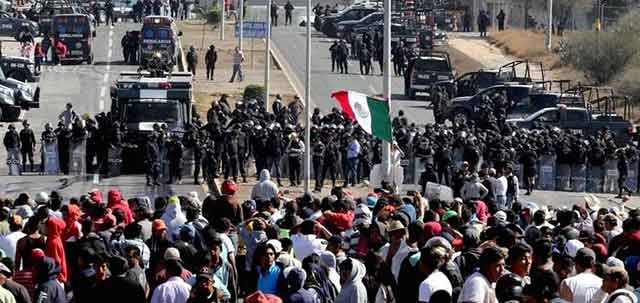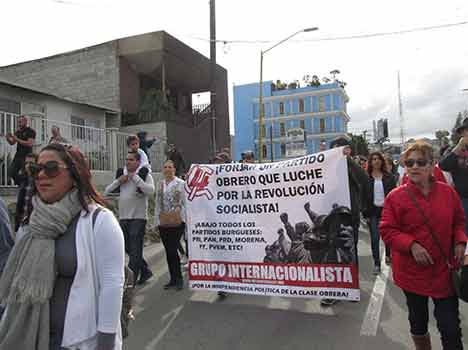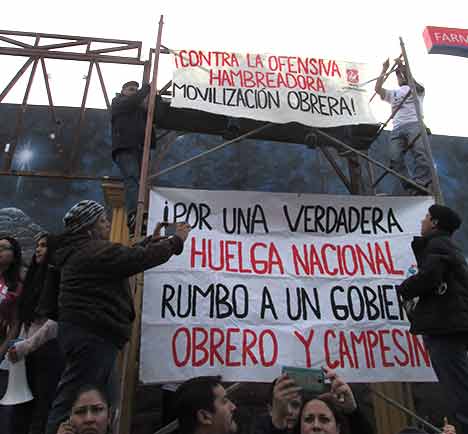
January 2017
Turn Protests
into Workers Revolt
Leading to the Struggle for Power
For Workers
Mobilization
to Smash the Gasolinazo!
Forge a Workers Party to Fight for International Socialist Revolution!

Demonstrators in Ixmiquilpan detained riot police, demanding protestors arrested during a police assault on a highway to Nuevo Laredo be released. (Desinformémonos)
Starting on New Year’s Day, the Mexican population has been hit by a 20% increase in fuel prices, what has become known as the gasolinazo (gasoline coup). Our comrades of the Grupo Internacionalista issued the following leaflet that is being distributed in Tijuana, Guadalajara, Mexico City and Oaxaca.
JANUARY 6 – “The country in flames” was the headline of an article in El Universal (5 January). Various websites of the national newspapers now have “minute by minute” coverage of the protests. Interactive maps show how the mobilizations spread day by day. Major highways have been severed by barricades for long periods. From Tijuana in the north to Chetumal in the south, truck drivers, peasants and workers give free passage at the tollbooths, while at some gas stations protesters pump the gas free of charge.
Meanwhile, there are reports from various localities of clashes between residents and police: Guadalajara, 2 January; the impoverished municipalities of Naucalpan, Ecatepec and Acolman in the the state of México1 on January 3; the districts of Gustavo A. Madero and Iztapalpa in Mexico City, along with Ixmiquilpan, Hidalgo, Monterrey and Nuevo León, January 5; in Rosarito, Baja California protesters who had blocked gas pipelines supplying this city and Tijuana were driven out by federal police in the early hours of January 6; and the list goes on.
TV news flashes images of looting as representative of the protests against the surge in gas prices; they suggest that “shadowy interests” are behind the “acts of vandalism.” But in spite of the spin, what we see is the mounting rage of the people, seemingly slipping out of the control of the government of imperialist puppet-president Enrique Peña Nieto. This Institutional Revolutionary Party (PRI) politician rules in concert with the “opposition” parties of the Pact for Mexico to impose precisely the counter-reforms that today show their results in the starvation attack against the workers and their families. Even “expert” pundits closest to the regime admit the “unpopularity” of Peña Nieto’s latest move, and while they exalt the doctrine of the “free market” they are apprehensive that the protests might get out of control.
Reports in the bourgeois press note with certain alarm that the “looters” of gas stations come from neighborhoods and housing complexes where riot police have been driven out by the residents under a hail of rocks. In Ixmiquilpan (Hidalgo state) the population detained various state riot police, demanding an exchange for protesters arrested in the course of a police assault on the highway to Nuevo Laredo. In Monclova (Coahuila state), the infamous special police unit “Fuerza Coahuila” also attacked protesters, but the crowd freed them.
Defenders of bourgeois order are scandalized by the looting, wailing that the poor are violating the sanctity of private property. The popular unrest, caused by a system that only produces hunger and oppression, is utterly justified. We in the Grupo Internacionalista call to direct this anger at the root of the problem, the capitalist system. What’s needed is a socialist revolution to seize from the bosses the enormous riches that they expropriate form the workers. The means of production and distribution should be in the hands of the working class. As Karl Marx said: expropriate the expropriators!
Workers at Pemex (the state oil company), under siege by the bosses, not only have an interest but also the power to enter the fray and transform the situation. Since Pemex workers literally control the gasoline pumps, they should decide how it is to be distributed to the population and at what price. But this would require a real class struggle, which would break once and for all the shackles of corporatism that have kept the oil workers under the control of the bourgeois state for decades. Only complete independence from the bosses’ state, and from the capitalist parties and politicians, can open the way to victory against the starvation offensive.
Since every class struggle is a political struggle, the key is to build a revolutionary, internationalist working-class leadership which the situation requires. We need to forge a revolutionary workers party!
The Energy Counter-Reform Leads to Impoverishment
 While the bourgeois populist party
MORENA of Andrés Manuel López Obrador seeks to capitalize on
protests against the gasolinazo, the Grupo
Internacionalista (shown here marching in January 15 protest
in Tijuana, Baja California) calls to oppose all capitalist
parties and to “Forge a Workers Party That Fights for
Socialist Revolution.”
While the bourgeois populist party
MORENA of Andrés Manuel López Obrador seeks to capitalize on
protests against the gasolinazo, the Grupo
Internacionalista (shown here marching in January 15 protest
in Tijuana, Baja California) calls to oppose all capitalist
parties and to “Forge a Workers Party That Fights for
Socialist Revolution.” (Revolución Permanente)
The panorama of protests that rang in the new year is the answer to the brutal increase in gasoline prices (the gasolinazo). 2017 did not begin well for the workers and their families. On December 27 the federal government of Enrique Peña Nieto of the PRI (Institutional Revolutionary Party) announced an initial increase of between 15 and 20 percent in prices for gas and diesel fuel, which went into effect on the first of the year. The government also announced that beginning on February 18 the price of these fuels would change daily. These increases come on top of a cumulative 38 percent increase in fuel prices since the beginning of the president’s six-year term.
Ever since the massive privatization of the Mexican National Railways under the auspices of presidents Carlos Salinas and Ernesto Zedillo, the bulk of the country’s goods are transported by road. This means that any increase in fuel prices puts direct pressure on the prices of other basic commodities. What’s more, the price of electricity and cooking gas is going up all across the country, and in many regions the price of drinking water is rising. Therefore, the gas price increase represents a direct attack on the living standards of the working people.
In some areas the situation is even worse. For the population of Baja California it’s not just the gasolinazo: on December 19 the National Action Party (PAN) majority in the state legislature, along with its allies of the Party of the Democratic Revolution (PRD) and the Citizens’ Movement (MC), approved the privatization of water, which will lead to a price increase of almost 300 percent for this indispensable resource. Add to this the increase in public transportation fares. The bus companies are calling for an increase to 18.50 pesos on their routes, since a 100-pound tank of cooking gas now costs more than 676 pesos. Like elsewhere along the northern border, this comes on top of the brutal devaluation of the peso against the dollar, leading to a 30% overall increase in housing and food prices. Clearly, the situation has become untenable.
If the consequences of the gasolinazo are clear, little has been said of its causes. The government claims it is a simple technical matter of “freeing up” the price of gasoline to conform to international oil prices. In televised messages transmitted throughout the country during the past two days, a nervous Peña Nieto has insisted that this measure is necessary to guarantee the “stability” of the economy (which if it were true, would have led to a fall in fuel prices, as many have pointed out). In reality, the gasolinazo is a direct result of the two-decade-long privatization of the energy sector. One of the great “reforms” pledged by the Pact for Mexico was the energy reform, accelerating the pace of privatization in Pemex at the demand of the imperialist financial institutions.
One of the most obvious effects of the privatizing assault is the beginning of mass layoffs at Pemex. Just today, hundreds of Pemex workers in Salina Cruz, Oaxaca and Poza Rica, Veracruz, to cite two representative examples, are getting pink slips. The National Union of Oil Workers of the Mexican Republic (SNTPRM), a corporatist institution that imposes the dictates of the bosses and their government on the oil workers to the letter, has accepted the mass layoffs so long as they are done “legally” … and so long as the top “union” officers get their share of the privatization payout through their own companies.
The fact that oil workers are under attack is a key element in planning a class-struggle strategy to roll back the gasolinazo, along with the anti-worker “reforms” that have smashed the living standards of the workers. So far, the mobilizations against the gasolinazo have fundamentally been lead by sectors of the petty bourgeoisie of the countryside and the cities: organizations such as El Barzón2 and various truckers organizations (owners of tractor-trailers rigs, buses and even taxis) have been at the head of protests in the highways and at the gas stations.
In the cities, various bourgeois parties, especially MORENA (Movement of National Regeneration) led by Andrés Manuel López Obrador (known by his initials, AMLO), the PRD and the “Labor Party” (PT),3 have sought to organize “symbolic” occupations of gas stations and government offices. MORENA promises that AMLO will lower fuel prices as soon as he becomes president in 2018 (!). For its part, the PRD, a co-signer of the Pact for Mexico, is directly responsible for the privatizing counter-reform in Pemex. Now it wants to pass itself off as an “ally” of the workers that it has attacked so many times, whether on its own or in alliance with the PRI and PAN. All these forces and political personalities put forward nothing more than various bourgeois currents that agree on the fundamentals: the defense and strengthening of capitalism, an all-embracing system of exploitation and oppression that can only bring more poverty (we are now into the ninth year of a global capitalist crisis from which there is still no way out).
The ongoing crisis of capitalism is no anomaly, it is an integral part of a system that impoverishes the masses while accumulating fabulous riches for the few. In these moments of struggle we must drive out all those bourgeois politicians who want to derail the protests to their benefit by presenting themselves as supposed opponents of the PRI government. It is truly absurd, disgusting and cynical that PAN and PRD politicians – who voted for the energy reform (and the other reforms) – have the gall to “unite” with the protests, such as in the city of Enseneda, Baja California. Meanwhile, MORENA would like to play fireman for the bourgeoisie, saying that the solution is to vote for this bourgeois party (partners of those who ordered the murder and kidnapping of the students of Ayotzinapa), to sign petitions and perpetuate the capitalist system of exploitation and death, as various pseudo-socialist groups (some of whom even call themselves “communist”) do in tailing tail after the bourgeoisie.
For this reason a complete shift in the class axis of these protests is needed. To achieve this, the workers of the energy sector, and particularly the oil workers, must play a key role. To defend their own jobs and turn back the effects of privatization in the sector, the oil workers could sell fuel directly to the population at five pesos per liter. This is utterly realizable at the big storage and distribution centers that Pemex has in every state. The proceeds should go directly to a strike fund, indispensable for the struggle to break the shackles of corporatism in the industry and for the simultaneous organization of genuine instruments of proletarian struggle bringing together not only the employees of Pemex but also of the various private companies active in the industry. Along with the urgent need to open the accounting books of Pemex and the other companies in the sector, this would points towards workers control of fuel production and distribution across the country.
 Grupo Internacionalista banners in
January 15 Tijuana protest call for: “Workers Mobilization
Against the Starvation Offensive,” and “For a Real National
Strike on the Road to a Workers and Peasants Government.”
Grupo Internacionalista banners in
January 15 Tijuana protest call for: “Workers Mobilization
Against the Starvation Offensive,” and “For a Real National
Strike on the Road to a Workers and Peasants Government.” (Revolución Permanente)
To finally begin a counteroffensive of the exploited and oppressed against decades of bosses’ attacks, we need a working-class, revolutionary program. First of all, it is necessary to understand the bourgeois character of the corporatist “unions,” which are nothing but labor fronts integrated into the capitalist state that act as real labor cops to quash any attempt at resistance by the workers. To fight corporatism effectively it does not suffice to fight for “democratization” of these outfits: it is necessary to build the kernel of genuine revolutionary leadership for the working class. All reformist perspectives are condemned to defeat: it is necessary to overcome all forms of narrow corporatism and break with bourgeois nationalism, pointing the way to unite the struggle of the Mexican workers with those on the other side of the borders, to the south as well as to the north. Oil workers must look to the dissident teachers of the CNTE as their natural allies, as well as to the health sector workers, who in addition to being under a brutal attack by “structural reforms” at the moment, have already shown solidarity, like the 72-hour hospital strike in Oaxaca last year in support of the teachers strike. Finally, it is fundamental to fight for the fullest political independence parties and politicians of the bosses: the PRI, PAN, PRD, MORENA and their two-bit satellites.
In Oaxaca the dissident teachers of Section 22 can be instrumental in carrying out a joint struggle of the various working-class sectors against the government assault. Key is the political perspective, which must be one of complete independence from the bourgeoisie. Instead of reviving a class-collaborationist organ like the APPO (the Popular Assembly of the Peoples of Oaxaca, which led the struggle in 2006), which included prominent bourgeois politicians like Flavio Sosa (at the time, of the “New Left” current of the PRD), what’s needed is class-struggle action of the workers against the bourgeoisie. Today, Sosa’s group, Comuna Oaxaca, an integral part of MORENA, puts forward a program to subordinate the workers struggle against the gasolinazo to the election campaign of AMLO, a bourgeois-nationalist caudillo who calls for a “loving republic” together with the Mexican capitalists. Break with the bourgeois popular front around AMLO!
In the current protests against the government of oppressors and exploiters, revolutionary workers call for intervention with a program of transitional demands, to transform the popular mobilizations into a working-class revolt pointing toward the seizure of power. To fight layoffs and unemployment, as well as to put a brake on the devastating effects of inflation, workers throughout the country should impose a sliding scale of wages (so that every increase in the cost of living is compensated by proportionate wage increases) and a sliding scale of working hours, to distribute the available work among all the workers without any pay cuts. The unions should also begin to organize neighborhood committees to control prices.
The working class is the only social class with the power and interest in sweeping away the rot, the violence and poverty of decaying capitalism. To carry out the necessary tasks what’s required above all is a revolutionary workers party, forged on the Trotskyist program of permanent revolution, which says that today’s democratic demands cannot be satisfied short of the seizure of power by the working class, leading to international socialist revolution.
In short, what is needed is a revolutionary leadership of the working class. Such a leadership can only take the form of a Leninist party of the proletarian vanguard, armed with theoretical-programmatic perspective of permanent revolution. These dark days can illuminate with their fires the path of struggle that the workers must undertake. We in the Grupo Internacionalista dedicate our efforts precisely to the construction of the indispensable revolutionary workers party carrying the Marxist program into the struggles of the workers. Join us in this effort! ■
- 1. The central region around the capitol (Mexico City).
- 2. A lobby of medium and large farmers, whose politics are exemplified by its slogan debo no niego, pago lo justo (I don’t renounce my debt, but I only pay what’s fair).
- 3. A thoroughly bourgeois party that was formed as an adjunct to the PRI, and has since become a satellite of the PRD.
